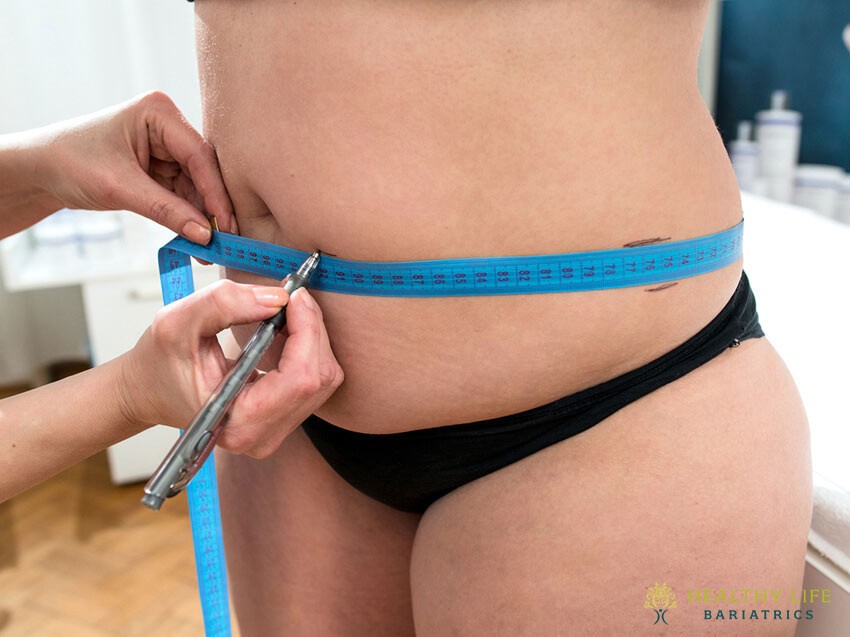Obesity rates in the United States continue to climb. Over 70% of Americans are considered overweight or obese, and an estimated 22 million Americans have BMIs over 40. Traditionally, Americans tend to seek the lifesaving assistance of bariatric surgery or gastric sleeve once their BMI exceeds 40.
However, clinical data consistently demonstrates the benefit of bariatric surgery at a lower BMI of 30-35. We advocate surgery at lower BMIs, and our experts explain the major benefits of acting early. Let's talk about BMIs.
Body Mass Index (BMI) Demystified:
BMI is a numerical value of a person's weight in relation to their height, serving as a screening tool for obesity. Traditionally, bariatric surgery has been associated with individuals with a BMI of 40 or higher, categorized as Class III obesity.1 However, as medical understanding evolves, the criteria are becoming more inclusive, considering the unique needs of those with lower BMI.
Health risks are strongly linked to BMI and waist circumference. A healthy BMI is between 18.5 and 24.9. You're considered overweight if your BMI falls between 25 and 29.9 and obese when your BMI reaches 30 or more. Extreme obesity is classified as a BMI of 40 and higher.
When patients are overweight, Dr. Moeinolmolki measures the circumference of the waist in order to assess the risks to your health that might come with being obese. For instance, carrying an excessive amount of fat around your hips puts immense amounts of pressure on your internal organs, which in turn can increase your risks of developing type 2 diabetes, heart disease, and other ailments.
If you're a woman, a waist size above 35 inches puts you at an increased risk. For men, the risk goes up when the waist size is greater than 40 inches.
Here at Healthy Life Bariatrics, Dr. Babak Moeinolmolki performs sleeve gastrectomy on our patients to help them lose weight and become healthier. The gastric sleeve reduces the size of your stomach. The surgery also changes your metabolism to help you quickly shed your excess pounds.
Surgery results in decreased levels of the appetite-stimulating hormone ghrelin and higher levels of leptin, an appetite-suppressing hormone. After bariatric surgery, patients have a lower desire to eat and find themselves feeling fuller faster than before surgery. Dr. Moeinolmolki's patients typically experience rapid weight loss and improvements in cholesterol, blood sugar, blood pressure, and other metabolic health parameters.

Most weight loss surgery patients have tried to lose weight through conventional means like diet and exercise. When the weight fails to budge, procedures like the gastric sleeve can offer a viable solution. The surgery involves the removal of 75% of your stomach.. The remaining portion of the stomach takes the shape of a tube or “sleeve.”
With good adherence to dietary and behavioral guidelines, patients shed on average 60% of their excess weight following sleeve gastrectomy.
Assessing Candidacy: sleeve gastrectomy for Lower BMI
Determining if you are a suitable candidate for bariatric surgery involves a comprehensive evaluation by a multidisciplinary team. Factors such as BMI, existing health conditions, inability to achieve weight loss through other means, and the impact of excess weight on your daily life will be considered.5 Consulting with a qualified healthcare professional is crucial for a personalized assessment.

Safety First:
Safety is a paramount concern for any surgical procedure. Recent studies and advancements have shown that bariatric surgery, including Sleeve Gastrectomy, can be safe and effective for individuals with lower BMI.6 However, individual health considerations and medical history play a crucial role in determining the safety of the procedure for each patient. Thorough presurgical screening is key.
Tailored Solutions:
Sleeve Gastrectomy, often referred to as gastric sleeve surgery, involves the removal of a large portion of the stomach, reducing its size by up to 75% and limiting food intake.7 For those with a BMI between 30 and 34.9, this procedure offers a tailored approach, promoting sustainable weight loss and improved health outcomes. One study found an average of 57.8% excess weight loss for sleeve gastrectomy patients with a BMI 30-34.9.8
Obesity puts pressure on nearly every aspect of your body, from your organs to your joints.. Your chances of developing chronic conditions significantly rise once your BMI reaches 30 and above and soars when you climb beyond a BMI of 40. Here are just some of the conditions you're at risk for:

Obesity is considered a chronic disease that can worsen without treatment. Reducing your BMI to 30 or under is important for lowering the risks to your health. When you can achieve a healthier weight, your chances of developing obesity-related illnesses like type 2 diabetes, elevated cholesterol, type 2 diabetes, and sleep apnea rapidly diminish. Aside from improvements to your health, many bariatric patients notice the following benefits.
As you lose weight and move more, you make even more strides in your overall health.
In our experience, early intervention is key to experiencing outstanding patient outcomes. Patients who undergo the sleeve gastrectomy before their BMI gets to 40 or higher are much more likely to drop below 30 BMI within the first year.
For the best outcome, the ideal time to discuss whether you can benefit from sleeve gastrectomy is when your BMI is 30-35. Remember, a BMI of 30 or below has a major impact on reducing your health risks. As your BMI climbs, it's more challenging and takes longer to bring it down to a safe range. This means waiting may result in less-than-ideal results.
Less than 10% of patients with a BMI of 50 or higher are able to drop it into a safe range within the first year, and it often takes several years. Considering that by the time most patients consider sleeve gastrectomy they're already battling at least one chronic disease, time isn't on your side. This makes it even more imperative that you get your BMI within a healthy range as quickly as possible.
The landscape of bariatric surgery is evolving, breaking down barriers that once limited its accessibility. Sleeve Gastrectomy, with its tailored approach, is proving to be a beacon of hope for individuals with lower BMI seeking effective and safe weight loss solutions. As with any medical decision, consultation with healthcare professionals is paramount. Together, let's navigate the journey to a healthier, happier you.
Dr. Moeinolmolki offers a variety of bariatric surgery options to help patients live longer, healthier lives. If you've tried everything to lose weight on your own, he can help. If you live in the Los Angeles area, schedule a consultation today by calling our office and speaking with our wonderful staff, or book an appointment online at your convenience.